"documentario cronistico"/documentary chronicle
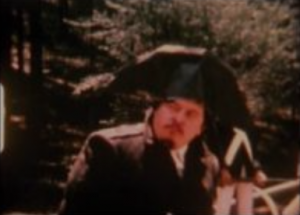
"Se trataba del regreso de un soldado de origen mexicano a la Ciudad de México después de haber combatido en Vietnam con las tropas estadounidenses. El hombre llega a la estación del ferrocarril de Buenavista y recorre la ciudad para acabar finalmente en el departamento de su hermano. Busca trabajo y no lo encuentra. Por la voz off que sigue el hilo de sus pensamientos, nos enteramos que a su mente guerrera le cuesta trabajo adaptarse a la vida pacífica. La película intercala una serie de secuencias oníricas que de alguna manera ilustran su delirio belicista: sueña que es un soldado griego que asesina al niño que lo molesta en el taxi colectivo (un pesero) que lo conduce a casa de su hermano; imagina en el personaje que lo entrevista cuando aplica para obtener un trabajo a Napoleón Bonaparte (interpretado por Juan José Gurrola) dirigiendo una batalla; o sueña que es un caballero medieval que asesina a su familia en un pacífico día de campo. Finalmente el personaje no encuentra cabida en la sociedad pacífica y acude –todavía en traje de caballero medieval – al aeropuerto para comprar un boleto de avión "a la guerra más próxima"" (Vázquez Mantecón, 2012).
"It is about the comeback of a Mexican soldier to Mexico City after fighting in Vietnam along with American troops. The man arrives to the train station in Buenavista y goes around the city to end up at his brother's apartment. He looks for a job and cannot find one. The off voice, that follows his train of thought, tells us that his war mind has trouble adapting to a peaceful life. The film inserts a series of dreamlike sequences that in a way illustrate his war delirium: he dreams he is a greek soldier that murders the kid that bothers him in a collective cab that drives him to his brother's house; he imagines the character that interviews him when he is looking for a job is Napoleon Bonaparte (played by Juan José Gurrola) directing a battle: or he dreams he is a medieval knight that murders his family in a peaceful day in the country. Finally the character doesn't find a place in a peaceful society and goes –still in medieval armor– to the airport to buy a by a plane ticket to the "nearest war" " (Vázquez Mantecón, 2012).
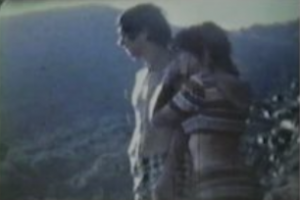
"Era una película que desarrollaba un tema muy propio de la contracultura de la época: la posibilidad de regresar a la naturaleza para vivir una vida al margen de la contaminación y de la vida moderna. Se trataba de una cinta de menos de diez minutos de duración, que contaba una historia breve pero ilustrativa de la naturaleza de los debates entre los jóvenes mexicanos cercanos a la contracultura. [...] La historia de Sergio García hacía una crítica al escapismo hippie, esperanzado por la posibilidad de crear un mundo alterno al de la realidad del capitalismo industrial" (Vázquez Mantecón, 2012).
"It was a film that developed a topic very related to the counterculture of the time: the possibility of going back to nature to live a life away from pollution and the modern life. The film lasted less than 10 minutes, and it told a brief but illustrative story about the nature of the debates between the Mexican youth that was close to the counterculture. [...] The story by Sergio García was a critique of the hippie escapism, hopeful for the possibility of creating an alternate world to the reality of industrial capitalism" (Vázquez Mantecón, 2012).
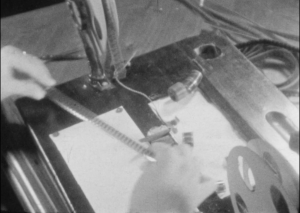
Visual poem, synchronized to the Arabesques of Claude Debussy, that reflects on the home as a space of cinematic creativity for the amateur. It is the only film from the period directly credited to a female amateur filmmaker.
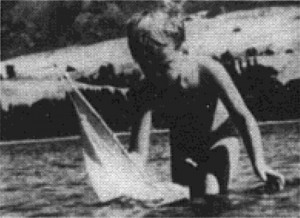
"Lindsay takes us on one of his family holidays into the mountain and lake areas. We are among the snow-capped hills, lush valleys, and many wild flowers, motoring and water-skiing on the lake" PSA Journal, Nov. 1960, 41.
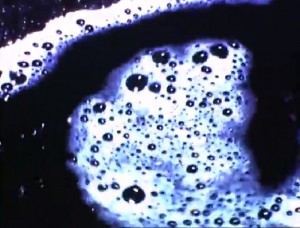
"Aqua Viva, as its name suggests, is a study of water in motion. To state it thus baldly, however, cannot reveal the true cinematic beauty of Allan Hammer's swirling patterns of light and shadow, executed with consistent success under the most difficult exposure conditions. Yet more important than Mr. Hammer's technical competence is his imaginative perception of small moments of great loveliness. Such scenes, however, because of their very delicacy, tend always to lose their effectiveness in large doses. Aqua Viva as a production leans toward excess length." Movie Makers, Dec. 1950, 466.
"A Hitchcock type film, the star's fear all being caused by an appointment with the dentist, but under the gas he dreams of meeting an attractive girl. But he wakes up just as it gets interesting." PSA Journal, Nov. 1956, 45.
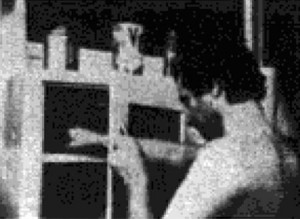
"The Applicant is a straightforward bit of cinema fare written and filmed by students at the New York University. The film deals with a sort of down-and-outer who appears to need a job in the worst way. So he looks in the want ads and finds a few businesses seeking applicants. He applies. Is he successful? Well, let's just say he gets something, but not exactly what you expect. The film relies to a great extent upon the acting of the central characters, and is not exactly a situation story, a genre often the easiest for amateurs to do. The lead character is well established, and the prospective employer does his job to perfection. The development of the plot, and the pacing are surely the outstanding aspects of this film which won for it not only the Gold Medal for the most outstanding film in the Festival, but also an automatic Ten Best rating, the MPD Scenario Award for the best Story film and a tie for the MPD Humorous film Award" PSA Journal, Aug. 1967, 35-36.
Total Pages: 299